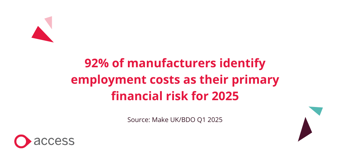 PeopleXD
PeopleXD
The role of HR in the manufacturing industry: navigating complex challenges
HR challenges in manufacturing industry have evolved far beyond the traditional personnel functions of decades past, reflecting the sector's transformation into a sophisticated, technology-driven economic powerhouse. With UK manufacturing contributing an impressive £191 billion to the economy, the stakes for effective human capital management are high.
Modern manufacturing HR requires sophisticated, integrated approaches that can navigate skills shortages, manage multi-generational workforces, ensure compliance across increasingly complex regulatory landscapes, and drive organisational performance in highly competitive global markets. In this blog, we discuss the state of HR in the manufacturing industries, some challenges the industry faces, and take a closer look at industries like food and drink manufacturing that face highly specific challenges.
In this article we are going to explore:
The evolution of HR in the manufacturing industry
As the industry has evolved, HR practices in the manufacturing industry have also had to evolve, from basic personnel management to strategic leadership.
Traditional vs modern manufacturing HR
Where traditional approaches focused on payroll processing, basic compliance, and reactive problem-solving, today's manufacturing HR professionals drive workforce planning initiatives, leverage talent analytics for decision-making, and lead digital transformation efforts across their organisations. The industry still faces tech challenges, which are detailed alongside implementation strategies in our Actionable guide to navigating HR tech challenges in retail, manufacturing and hospitality sectors.
Current strategic imperatives include predictive workforce planning that anticipates skills requirements months ahead, talent analytics that inform retention strategies, and digital transformation initiatives that modernise everything from recruitment to performance management.
The unique demands of the manufacturing industry
Manufacturing environments present challenges that require specialised HR approaches. Complex shift patterns across 24/7 operations require sophisticated scheduling systems, whilst safety requirements necessitate comprehensive training programmes and continuous compliance monitoring.
In large organisations, multi-site coordination adds another layer of complexity. Organisations managing facilities across different regions with varying local regulations and cultural considerations need their HCM system to take into account various legislative differences.
Health & Safety Executive requirements, working time regulations, and sector-specific compliance also create demanding frameworks.
The current state of HR practices in the manufacturing industry
Many manufacturing organisations are still transitioning from legacy systems and traditional approaches. Whilst some have embraced advanced HR technology and strategic practices, others continue to rely on outdated processes that limit their ability to compete for talent and drive operational excellence.

What are the main 5 HR challenges in the manufacturing industry?
The HR challenges in the manufacturing industry reflect the growth and advancement of the industry, all requiring sophisticated solutions.
1. Skills shortage: Closing skills gaps through training and development
91% agree that their business is taking on more responsibility to train its workforce due to scarcity (Barclays/The Manufacturer 2024 survey).
Skills shortages in technical and specialised manufacturing roles continue to impact operational efficiency across the sector. Organisations struggle to track training completion and certification compliance whilst identifying development needs across their diverse workforce.
Ensuring health and safety training remains current and accessible presents ongoing challenges, as does creating meaningful development pathways for skilled workers. Integrated learning management systems with skills gap analysis and compliance tracking capabilities enable organisations to address these challenges systematically.
2. Staff shortage: Navigating recruitment challenges and complex workforce structures
77% of manufacturing companies report staff shortages in operational roles.
Manufacturing sites typically house multiple roles. From production operators and technical specialists to supervisory staff and administrative personnel, each role comes with distinct requirements and working patterns.
Varying shift patterns can create significant scheduling and communication challenges, whilst tracking diverse workforce performance and engagement can become increasingly complex during periods of understaffing. These challenges multiply across multi-site operations and finding qualified candidates who understand manufacturing environments grows increasingly difficult.
Workforce management solutions that accommodate diverse roles and shift patterns, like PeopleXD Evo, can address these challenges by centralising scheduling, performance tracking, and communication across all workforce segments.
3. Increasing labour costs: Operational excellence through people analytics
92% of manufacturers identify employment costs as their primary financial risk for 2025 (Make UK/BDO Q1 2025).
As labour costs continue to rise, real-time workforce data can help to drive informed business decisions that balance cost management with operational efficiency. Identifying trends in absence, turnover, and performance can also become difficult when manual reporting processes limit strategic insights. Without clear visibility into workforce costs and productivity metrics, organisations struggle to justify labour investments or identify areas for improvement.
Balancing productivity metrics with safety and quality indicators requires sophisticated analytics that many traditional HR systems cannot provide. Custom dashboards and live reporting solutions designed for manufacturing-specific KPIs could deliver the insights needed to drive operational excellence whilst controlling labour costs and maintaining focus on safety and quality standards.
4. Recruitment freeze: Maximising workforce potential
More than half of UK manufacturers are freezing recruitment efforts.
Recruitment freezes can put pressure on large manufacturers to maximise their existing workforce. The complex regulatory landscape, encompassing Health & Safety Executive requirements, working time regulations, and COSHH compliance, becomes even more challenging to manage with reduced HR resources. Without the ability to bring in new talent, organisations must focus on developing existing employees, improving retention, and ensuring compliance standards don't slip during resource constraints.
Automated compliance tracking and centralised policy management systems enable organisations to maintain consistent standards whilst reducing administrative overhead. This allows HR teams to focus on the people in the organisation. Self-service with AI integration, like Copilot in PeopleXD Evo, can help reduce the burden as employees can surface company documentation instantly.
5. Attrition: Driving employee engagement and retention
Wage increases may slow as 60% of increased NICs costs could be passed on to employees (OBR estimates).
High attrition rates in manufacturing can create challenges that compound one another. From increased recruitment costs to knowledge loss and operational disruption, attrition is a significant HR challenges in the manufacturing industry. Engaging shift-based workforces with varying access to digital tools also presents unique retention challenges.
Building culture and connection in physically demanding environments requires creative approaches, particularly when communication across multiple sites becomes complex. Reward and recognition systems could acknowledge manufacturing-specific achievements, whilst career development opportunities benefit from catering to non-office-based roles.
Mobile-first engagement tools designed for manufacturing workflows could enable consistent communication regardless of location or shift pattern, providing clear development pathways that encourage long-term commitment.
Recent industry reports highlight that vacancy rates in food and drink manufacturing are significantly higher than in the wider manufacturing sector and the UK average. These numbers reflect the acute difficulty in attracting and retaining the right people, especially for operational and technical roles. Many businesses describe the situation as “chronic,” with ongoing shortages affecting everything from production schedules to quality control. We’ve detailed some of the specific challenges below; whilst some will overlap with the wider manufacturing industry, the food & drink industry will have their own specific pain points within those.

What are the people pain points and challenges in food & drink manufacturing?
The unique characteristics of food and drink production - perishable goods, seasonal demand, and stringent hygiene standards - amplify common HR issues in the manufacturing industry.
Complex workforce management & scheduling
Managing a food manufacturing workforce isn’t just about rotas; it’s about balancing perishable ingredients, strict regulatory compliance, and peak seasonal demands. Nearly all companies in the sector face challenges in managing diverse workforces with complex shift systems, including 24/7 operations and significant seasonal fluctuations, alongside a heavy reliance on temporary or agency labour. Manual scheduling or disconnected systems can lead to inefficient shift coverage, compliance breaches, and unnecessary overtime costs.
Talent attraction & retention of skilled labour
Attracting and retaining the right talent, from production line workers and engineers to hygiene professionals and quality control specialists, remains a consistent struggle. Skill shortages are widespread, and many manufacturers report difficulty filling both operational and technical roles. The need for upskilling, providing clear career progression, and creating a positive work culture is more urgent than ever.
Payroll complexity & inaccuracy
The varied nature of food and drink manufacturing operations often means diverse pay structures. Managing payroll for high volumes of employees, with variable hours, shift differentials, overtime, and a mix of permanent, temporary, and agency staff, is a significant administrative burden. This complexity can lead to costly inaccuracies, compliance issues, and employee dissatisfaction, diverting valuable HR resources from strategic initiatives.
Health, safety & regulatory compliance
Food and drink manufacturers operate under exceptionally stringent food safety and hygiene regulations (such as HACCP and BRC standards), in addition to general workplace safety. Ensuring continuous training, robust record-keeping, and instant access to compliance data for everything from machinery operation to allergen control is a legal imperative. Failure to comply can lead to costly recalls, fines, and reputational damage.
Employee engagement & wellbeing
Maintaining high levels of employee engagement, morale, and overall wellbeing is a recurring challenge, especially in physically demanding, repetitive, or high-paced factory environments. The pressures of production targets, shift work, and sometimes challenging working conditions can impact wellbeing and increase staff turnover. Supporting staff mental and physical wellbeing and cultivating a positive work culture are essential to reducing attrition and improving productivity.
Integration of disparate legacy HR systems
Many food and drink companies have established or inherited multiple legacy HR systems (for payroll, time and attendance, or training), creating a siloed approach to workforce planning, recruitment, and talent management. In an industry where margins are tight and speed is critical, relying on disconnected HR, payroll, and rostering systems creates significant inefficiencies, data silos, and hinders agile decision-making.
COOK's HR team were brutally honest about their situation: "We did not want the IT team and the people team wasting their time trying to get two systems to talk to each other."
This frustration is echoing across manufacturing floors nationwide. When your payroll system doesn't talk to your time tracking, when training records live in spreadsheets, when workforce planning happens in isolation from actual operational data – you're not just inefficient, you're limiting growth.
COOK's approach: They chose integrated payroll and HR functions specifically to eliminate this waste. The result isn't just operational efficiency – it's strategic capability. They can now "accommodate their strong growth curve" because their systems scale with their ambitions rather than constraining them.
Read the COOK case study to find out more.
Impact of automation & reskilling
The drive for automation in food and drink manufacturing, from robotics in packaging to AI-driven quality control, offers real potential to boost productivity and streamline administrative tasks. However, it also presents a significant challenge: ensuring the existing workforce is reskilled for new technical roles. Many HR leaders are seeking better tools and strategies to support this transition and ensure the workforce is ready for the future.
Supply chain pressures on workforce planning
External pressures like supply chain disruptions, fluctuating raw material prices, and energy cost inflation directly impact production planning and efficiency. This translates to workforce planning: HR teams need agile systems that allow them to quickly adapt staffing levels and skills to meet ever-changing operational needs, preventing costly downtime or unnecessary labour costs.

PeopleXD Evo solutions for HR issues in the manufacturing industry
HR issues in the manufacturing industry are particularly challenging; therefore, a software solution needs to understand the unique operational demands. It also requires several integrations to help large manufacturers effectively manage their staff. Our HR Software is suitable for the manufacturing industry for several reasons.
Integrated HCM
Manufacturing organisations benefit from seamless integration with existing systems including ERP, MES, and quality management platforms, creating unified data flows that eliminate silos and reduce administrative overhead. Multi-site, multi-shift functionality accommodates the complex operational structures typical of manufacturing businesses.
Mobile-first solutions enable shop floor workers to access essential HR functions without disrupting production workflows, whilst manufacturing-specific system architecture ensures the platform adapts to your operational requirements rather than forcing you to change established processes. If you want to check which HCM system has mobile-first solutions and a host of other features suitable for manufacturing industries, check out our comparison of the Best HCM Software for large businesses.
Real-time workforce management
Advanced scheduling and workforce optimisation tools address the dynamic nature of manufacturing operations through intelligent shift management and scheduling optimisation that balances operational needs with employee preferences and regulatory requirements.
Real-time absence management and cover planning capabilities ensure production continuity by automatically identifying suitable cover arrangements based on skills, availability, and certification requirements. Absence management across various locations can be particularly challenging; our blog on How to manage absence in multi-site and multi-country workforces details strategies for managing disparate and complex workforces, something the manufacturing sector wrestles with frequently.
L&D platform integration
Comprehensive learning and development integration supports manufacturing-specific training requirements through skills gap analysis and training needs identification that aligns workforce development with operational objectives.
Compliance training tracking and certification management ensure regulatory requirements are consistently met across all sites and roles, whilst automated renewal notifications prevent costly lapses in essential certifications.
Discover how PeopleXD Evo can address your specific manufacturing challenges
Watch our 4-minute demo to see the platform in action or visit our manufacturing sector page to learn more about our industry-specific solutions.

HR software brochure
Find out how our HR software can help you achieve your business goals.

Schedule your demo
One of our HR software experts will be in touch to build a demo with the features you need to see.

Watch 4-min demo
Explore the features and benefits PeopleXD Evo offers in our 4 minute video.

 AU & NZ
AU & NZ
 SG
SG
 MY
MY
 US
US
 IE
IE